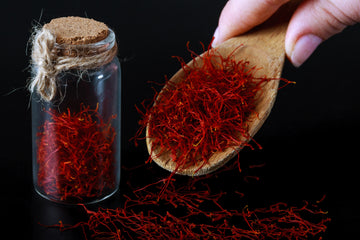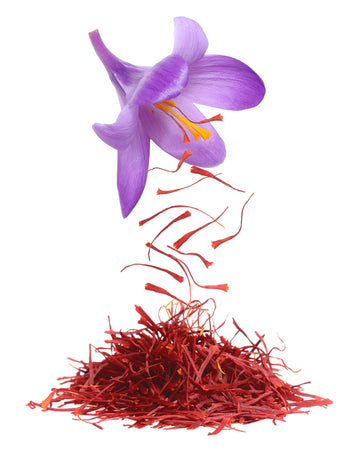UNVEILING ITS SECRET HEALTH BENEFITS
by SAFI SAFFRON on May 21, 2023

Saffron: Unveiling Its Secret Health Benefits Backed by Scientific Research
Saffron, known as the "red gold," has been prized for centuries for its culinary uses and distinctive flavor. However, this exquisite spice offers more than just a delightful taste and vibrant color to your dishes. Saffron boasts a treasure trove of health benefits supported by scientific research. In this article, we will explore the numerous ways in which saffron can enhance your well-being and improve your overall health.
1. Promotes Mood and Mental Health
Saffron has long been recognized for its ability to uplift mood and alleviate symptoms of depression. Several studies have revealed that saffron supplementation can be as effective as certain antidepressant medications, without the associated side effects. [1] The spice enhances the production of serotonin, a neurotransmitter known to regulate mood, promoting feelings of happiness and reducing stress.
"A randomized, double-blind study conducted at the University of Tehran demonstrated that saffron supplementation significantly reduced symptoms of depression in individuals with major depressive disorder, offering a promising natural alternative to conventional antidepressant treatments." [2]
2. Supports Cognitive Function
Saffron contains several compounds, including crocin and safranal, which have been shown to improve cognitive function and memory. These components exert antioxidant and anti-inflammatory effects on the brain, protecting it against age-related neurodegenerative diseases such as Alzheimer's and Parkinson's. Moreover, saffron enhances blood flow to the brain, which further supports cognitive health.
"A study published in the Journal of Psychopharmacology found that saffron supplementation improved cognitive function and memory in older adults with mild cognitive impairment, highlighting its potential as a natural intervention for age-related cognitive decline." [3]
3. Boosts Eye Health
Rich in antioxidants like crocin and crocetin, saffron is beneficial for maintaining healthy vision. These compounds protect the retina from oxidative stress and slow down the progression of age-related macular degeneration (AMD) and cataracts. Saffron's anti-inflammatory properties also help reduce eye inflammation and relieve symptoms of conditions like dry eye syndrome.
"Research published in the British Journal of Ophthalmology demonstrated that saffron supplementation significantly improved visual acuity and contrast sensitivity in individuals with early-stage AMD, emphasizing its potential in preserving eye health." [4]
4. Regulates Blood Sugar Levels
Saffron has shown promising effects in managing blood sugar levels and preventing complications associated with diabetes. Studies have found that saffron extracts can enhance insulin sensitivity and reduce insulin resistance, thereby helping to control blood glucose levels. Additionally, saffron's antioxidant properties may protect pancreatic beta cells, which are responsible for insulin production.
"A randomized, placebo-controlled trial conducted at the Mashhad University of Medical Sciences found that saffron supplementation significantly reduced fasting blood sugar levels and improved glycemic control in individuals with type 2 diabetes, suggesting its potential as a natural adjunct therapy for diabetes management."
5. Supports Heart Health
Research suggests that saffron can contribute to cardiovascular health by improving lipid profiles, reducing cholesterol levels, and preventing the oxidation of LDL (bad) cholesterol. [5] The spice's antioxidant properties help reduce oxidative stress and inflammation, reducing the risk of heart disease and stroke.
"A meta-analysis of clinical trials published in the Journal of Nutrition and Metabolism found that saffron supplementation significantly decreased total cholesterol, LDL cholesterol, and triglyceride levels, while increasing HDL (good) cholesterol levels, thereby promoting heart health."
Conclusion
Beyond its culinary uses, saffron offers an array of health benefits that are supported by scientific research. From improving mood and cognitive function to protecting eye health and regulating blood sugar levels, saffron proves to be a valuable addition to a healthy lifestyle. Embracing the power of saffron can help you unlock its remarkable potential and enhance your overall well-being. Remember to consult with a healthcare professional before incorporating saffron or any new supplement into your routine.
Discover the Pure Essence of Saffron with SafiSaffron - Elevate Your Culinary Experience and Unleash the Health Benefits of Nature's Golden Spice!
Reference:
- Moshiri, M., Vahabzadeh, M., & Hosseinzadeh, H. (2014). Clinical applications of saffron (Crocus sativus) and its constituents: a review. Drug research, 287-295. https://www.thieme-connect.com/products/ejournals/html/10.1055/s-0034-1375681
- Raison, C. L. (2017). The promise and limitations of anti-inflammatory agents for the treatment of major depressive disorder. Inflammation-Associated Depression: Evidence, Mechanisms and Implications, 287-302. https://link.springer.com/chapter/10.1007/7854_2016_26
- Lewis, J. E., Poles, J., Shaw, D. P., Karhu, E., Khan, S. A., Lyons, A. E., ... & McDaniel, H. R. (2021). The effects of twenty-one nutrients and phytonutrients on cognitive function: A narrative review. Journal of Clinical and Translational Research, 7(4), 575. https://www.ncbi.nlm.nih.gov/pmc/articles/PMC8445631/
- Govoni, S., & Fahmideh, F. Targeting early stages of diabetic retinopathy: the modulation of VEGF via PKCβӀӀ/HuR cascade. https://iris.unipv.it/bitstream/11571/1468340/2/PhD%20Dissertation%20Foroogh%20Fahmideh_PDFA.pdf
- Iman Nabilah Abd Rahim, Noor Alicezah Mohd Kasim, Mohamad Rodi Isa, and Hapizah Nawawi. 2022 Aug 29. A Systematic Review on the Effect of Saffron Extract on Lipid Profile in Hyperlipidaemic Experimental Animal Models. https://www.ncbi.nlm.nih.gov/pmc/articles/PMC9438859/




